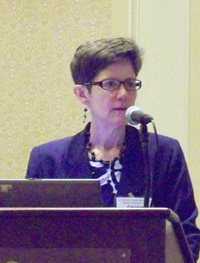Recapping the Conference on Health Policy Statistics

Plenary speaker Carolyn Clancy, AHRQ, highlighted the second day of the program, speaking on the importance of methodological work in the CER agenda.
The 2010 International Conference on Health Policy Statistics (ICHPS) was held in January at the elegant Fairmont Hotel in Washington, DC. In line with the American Statistical Association’s recent initiatives to further its efforts at engaging policymakers and other stakeholders in the health policy arena, ICHPS 2010 focused its program entirely on quantitative analysis of data related to pressing health policy issues.
The conference had an array of high-quality workshops, tutorials, and speakers made possible by the generous support of the Agency for Healthcare Research and Quality (AHRQ), Harvard Clinical Research Institute (HCRI), Lilly USA, Pfizer Inc., RTI International, Valence Health, and the Veterans Health Administration of the Department of Veterans Affairs. Another integral component to the success of the conference was the program chair, Anirban Basu, who deserves special thanks for all his hard work in putting together a program that received rave reviews.
After a full day of preconference workshops on Bayesian methods in clinical trials, longitudinal data analysis, propensity score methods, microsimulation modeling, and cluster randomized trial designs, ICHPS kicked off with an engaging combination of reception and poster session, with 34 posters presented by health policy researchers and statisticians at various levels in their careers.
One feature of the poster session was the large number of contributors from industry, an indication that the recent hubbub about comparative effectiveness research (CER) has already spread well beyond academic circles. One of the conference sponsors, Valence Health, used the poster session to showcase projects it is working on involving community-based health interventions and the development of novel techniques for linking patient records across multiple practice management systems.
Plenary speaker Carolyn Clancy, AHRQ, highlighted the second day of the program, speaking on the importance of methodological work in the CER agenda that is sweeping the nation. One of her key messages is: “Doctors routinely publish results without comparing them to what others have already done. We (statisticians and health policy researchers) need to help doctors make better decisions by raising the bar by which they conduct research.” Clancy’s talk was followed by fanfare with the inaugural Health Policy Statistics Section’s midcareer and long-term excellence awards. The midcareer award winner was Marc Elliott, while the long-term excellence awardees were Arlene Ash and Alan Zaslavsky.
The plenary session was supplemented by a range of invited, topic-contributed, and contributed sessions. Details of these sessions can be found at www.amstat.org/meetings/ichps/2010/index.cfm. The most popular sessions addressed topics such as statistical issues in drug safety, adaptive treatment strategies, models for healthcare reform, multiple treatment meta-analysis, decision models in priority setting, and missing data methods.
The third day followed with equally interesting sessions on health disparities, estimation of treatment effects, and data confidentiality. The final session was a highly informative and engaging symposium, “Putting the Research Back in Comparative Effectiveness Research,” featuring such experts as Jean Slutsky, Sean Tunis, Merrick Zwarenstein, and Constantine Gatsonis. Like any good concert, the conference had an encore: a late-breaking workshop by AHRQ that offered an introduction to the Medical Expenditure Panel Survey (MEPS).
The 2010 program was attended by 229 people (including 23 students) from academia, government, and for-profit and not-for-profit industries and foundations worldwide. As its name indicates, the ICHPS is an international conference and attracts researchers from outside of the United States (15 total, of whom seven were from Canada). In addition to conversing in statistical methods, international attendees make a valuable contribution by presenting and discussing their experiences working on problems in health policy and related areas that might be relatively new to the United States, such as mandated CER. Information gained and lessons learned from these researchers by U.S.-based researchers will be invaluable in the years ahead.
We look forward to the upcoming ICHPS to be held in Cleveland, Ohio, in October 2011. For information, contact the conference co-chairs, Thomas Love thomas.love@case.edu and James O’Malley omalley@hcp.med.harvard.edu Ambitions for the next conference are increasing its international visibility, increasing participation (especially by students), building on the outstanding continuing education program at the 8th ICHPS, and of course conducting the second HPSS awards presentation. We welcome ideas and also international and other partners interested in taking an active role in the conference.

















